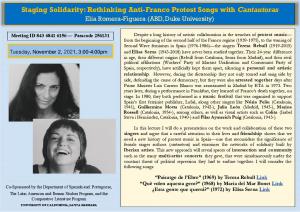Event Date:
Event Location:
- Meeting ID 843 6841 6156 - Passcode 256131
Despite a long history of artistic collaboration in the trenches of protest musicfrom the beginning of the second half of the Franco regime (1939-1975), to the waning of Second Wave feminism in Spain (1976-1986)-the singers Teresa Rebull (1919-2015) and Elisa Serna (1943-2018) have never been studied together. Their 24-year difference in age, their different origins (Rebull from Catalonia, Serna from Madrid), and their rival political affiliations (Workers' Party of Marxist Unification and Communist Party of Spain, respectively), have artificially kept them apart, silencing a personal and artistic relationship. However, during the dictatorship they not only toured and sang side by side, defending the cause of democracy, but they were also arrested together days after Prime l\llinister Luis Carrero Blanco was assassinated in Madrid by ETA in 1973. Two years later, during a performance in Frankfurt, they learned of Franco's death together, on stage. In 1980, they both performed in a music festival that was organized to support Spain's first feminist publisher, LaSal, along other singers like Nuria Feliu (Catalonia, 1941), Guillermina Motta (Catalonia, 1942-), Julia Leon (Madrid, 1945-), Marina Rossell (Catalonia, 1954-), among others, as well as visual artists such as Colita (Isabel Steva i Hernandez, Catalonia, 1940-) and Pilar Aymerich Puig (Catalonia, 1943-). In this lecture I will do a presentation on the work and collaboration of these two singers and argue that a careful attention to their lives and friendship shows that we need a new history of protest music in Spain-one that reconsiders the significance of female singer authors (cantautoras) and examines the networks of solidarity built by Iberian artists. This new approach will reveal spaces of intersection and community such as the many multi-artist concerts they gave, that were simultaneously under the constant threat of political repression they had to endure together. I will consider the following songs: "Paisatge de l'Ebre" (1969) by Teresa Rebull Link "Que volen aquesta gent?" (1968) by Maria del Mar Bonet Link �Esta gente que querra?" (1972) by Elisa Serna Link

